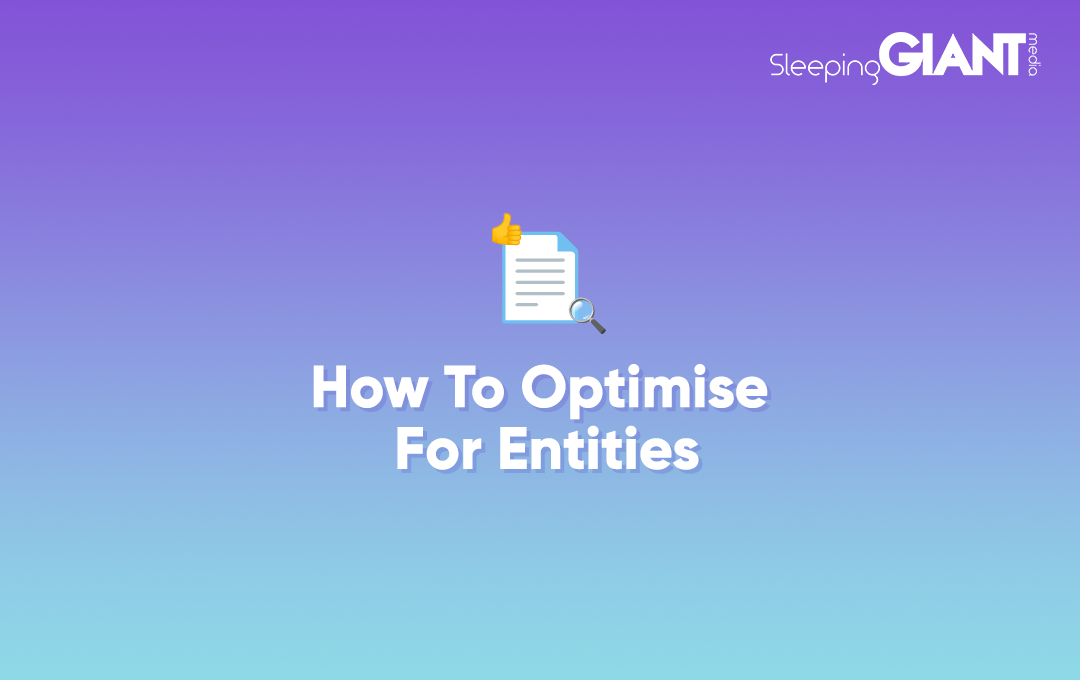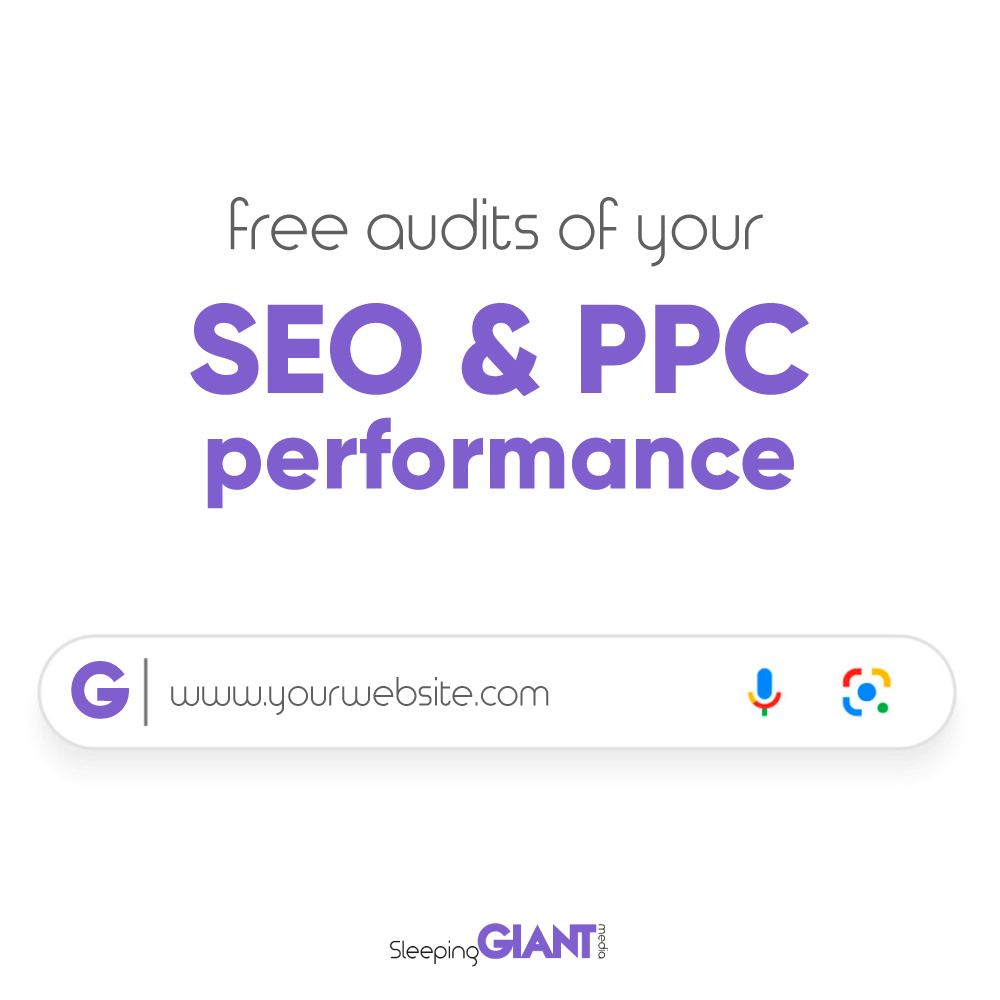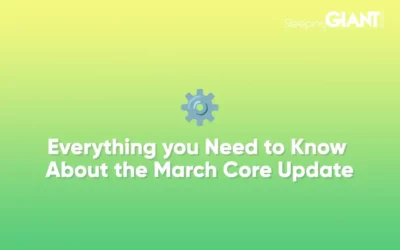
How to Optimise for Entities with Entity SEO
If you’ve read our previous blog on entity SEO, you should know what entities are, how they work, and what Google’s ‘catalogue’ for them looks like. Good job.
Now, it’s time to put it all together – and take a look at how to optimise your site for entities.
We’ll explain how to perform an entity audit, how structured data can support entity SEO and how to optimise your content for entities, so you’re in the best position possible if changes to SERPs start to happen in 2024.
There’s a lot of information to cover, so let’s get started.
Performing an entity audit
If you want to start optimising a website for entities, you need to start from the beginning – and work out what your entities should actually be. To do this, you can perform an entity audit.
You’ll need to look at all of the entities on the site, and work out how they are connected – and whether they’re the entities you should actually be targeting. To perform an audit:
1. Get the top search queries for your site
2. Extract the entities which occur most frequently – using tools like Google NLP, TextRazor, Inlinks or the SEMRush topics tool
3. Cluster the entities (draw it out) or use a tool to do it (AI tools can help with this)
4. Once grouped, analyse the topics in more detail – using these to make suggestions on other content that could be created to support them, or other entities that should be being targeted.
Lean on structured data
If you’re looking to optimise for entity SEO then structured data is going to be your friend.
We can use structured data to strengthen the entities on webpages, as well as helping to create relationships between them – which Google wouldn’t necessarily recognise on its own.
Structured data is a type of in-page markup code that you can weave into the head section of the page that the information applies to, which essentially clarifies different elements for Google. Think of it like labelling certain aspects of a page — or entities — to provide Google Search with explicit clues about the meaning of the information found within.
The different types of structured data markup we can use to tell Google about the entities on a page include:
- sameAs, knowsAbout, about, and mentions to reference other places talking about that entity, such as Wikidata, Wikipedia and even Google searches
- employedBy to show that a person works for a business
- parentOrganization or subOrganization to tell Google about other businesses related to the main business
Remember, the aim with structured data is to strengthen the connection of a website or brand with certain terms and entities.
Kelly Sheppard, Senior SEO Lead, explains the importance of structured data when it comes to the future of entity SEO:
“Google’s Knowledge Graph uses structured data to understand entities and the relationships between them. By writing bespoke entity-based structured data we can “talk” to the Knowledge Graph, which will play an essential role if Search Generative Experience comes into play in the future.
“The AI learns from entities it knows about and connects those entities with content in order to serve answers, so by strengthening those entities on your pages and between your brand and your products, you are helping the AI to understand more about those entities and relationships – which it otherwise might not know about.”
Prepare for the SGE shift
While the main shift to Google’s new Search Generative Experience is expected to happen in 2024, our in-house SEO experts believe that people need to start thinking and planning now if they want to stay ahead of the curve.
And how can you do this? By optimising your content, considering the relative importance of keywords, and understanding the newfound significance of internal links compared to external links.
Optimising your content for entities
There has been a lot of talk about the future of Google’s Search Generative Experience. What we do know for now is that it’s still an experiment in beta (Google has always referred to it as an experiment), and there is no certainty whether it will or will not launch in the future.
So, what can SEO experts and content writers do in the meantime? Well, it’s fair to say that AI isn’t going anywhere, particularly with the search engine experience. Therefore, it’s important that we think ahead and start optimising our content, taking into consideration the relative importance of keywords, and understanding the newfound significance of internal links compared to external links.
In order to optimise your content for entities, you’ll need to focus less on keyword-optimised landing pages and more on semantics in search. This changes how we think about site architecture, NLP & structured data too!
When writing or reading content, look at the concepts, brands, products, and things they are talking about. These will be your entities. Creating high-quality and relevant content around these entities will be the key to success in the future.
Keywords vs entities
Keywords are specific queries that users type into search engines. In contrast, entities are distinguishable objects or concepts that keywords often refer to.
- Keywords may be a phrase, a statement, or a question. Keywords act as the bridge between user queries and web content.
- Entities are a “thing or concept that is singular, unique, well-defined and distinguishable”. These entities should be distinct from other entities or keywords on each page.
- Use more keywords when there’s an entity that is not very well known, e.g. one that doesn’t have a Wikipedia entry. Keywords with poor to no entity coverage will not rank well for your topic
Here is an example of the difference between keywords and entities, using Sleeping Giant Media as an example.
Keywords
- Digital marketing agency
- Digital marketing services
- Digital marketing kent
- Local seo services
- Paid search agency
- SEO agency
Entities
- Digital marketing
- Agency
- Paid search
- SEO
- Kent
- Marketing services
Kiss AMSV goodbye!
Previously, content would be dependent on keywords and topics with high AMSVs (or Average Monthly Search Volumes). However, writing content which doesn’t exist — or about things with 0 search volume — is actually a great way of creating extra depth around entities.
When considering that 15% of daily searches are brand new, it makes sense to target a wider range of topics anyway, regardless of popularity. If you create content about things people want to read — AMSV aside — you will likely still start to get volume, as Google will show your content as relevant information.
Look on the Wikipedia page for that entity and expand on that! Add value, facts and unique insight. Remember – there can’t be a search volume if there’s no content in the first place to show them!
Arthur Filipavicius, our SEO Lead, said that there are currently a lot of question marks around how SGE and entities will affect the way we use keywords, with uncertainty around how we’ll acquire volumes, and how they’ll be categorised once SGE is launched.
“One thing that we do know is that content is going to become more relevant and important than ever. Users will be asking a wide variety of questions and ideally the site will have to have the answers somewhere to get quoted by search engines,” he explains. “For now, it’s about testing entity SEO to see if it works the way we understand it will – and remaining agile to how future strategies around things like keyword research will be affected.”
Looking to the future of SEO …
Optimisation included, it’s safe to say that lots of SEO best practices for content and keywords alike may change dramatically with the introduction of more AI into the search experience, and as a result of the increased importance of entities. Let’s take a look at what some of these changes might look like.
Later, link building 👋
Link building may no longer be necessary thanks to the rise of entities. This is because Google understands “brands” are entities, so any mentions of your brand, whether linked or not, all adds to its Knowledge Graph about that brand! (We’re shocked, too, trust us).
That’s why brand reputation is so important now. Google can understand the sentiment about a brand (positive or negative) and that affects your rankings; remember, Google wants to give customers the best experience.
Mentions on pages with a strong relationship with your entities are more important than a high Domain Authority, and the relevance of that mention is now more important than the authority of the source of the backlink.
Internal linking
However, internal linking is likely to become more important than ever with Entity SEO. If you don’t link your entities together with internal links as well as structured data, the relationship won’t be as strong as it should be.
This is where something known as ‘pillar-based marketing’ will come into play. This is a form of marketing that uses a strategy that revolves around entities and connections. Here’s an example:
- Create a main entity page
- Create secondary entity pages linked to the main entity page and point them to the main page
- Create blog posts or content around those entities and point them to the most relevant secondary or main entity pages
You can use tools like InLinks to do internal linking automatically. Pro tip: If you add some Javascript to the page, you have control over all the internal links on the site.
Entities explained
So, there you have it. From what they are to how to optimise for them, you should now feel pretty confident with entities.
Don’t forget that you can find further information about SEO, entities, and digital marketing on our blog
Still got questions? Get in touch with our team of technical SEO experts today.
Blog
Everything you Need to Know About the March Core Update
We knew it wouldn’t be long before Google released their first core update of...
Giant Wednesday
How To Optimise Images For Websites
Digital Marketing, technology & business insights, how-to's and explainer...
Follow Us
Sign Up For More
Stay up to date with the latest happenings, learnings, events & more with our GIANT Newsletters.
Contact Us
Top Floor, The Civic Centre, Castle Hill Avenue, Folkestone CT20 2QY.





